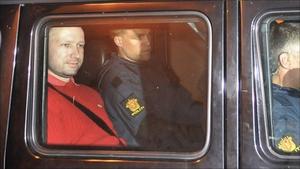Terror in NorwayNorway attacker claims did not act alone
Anders Behring Breivik, has pleaded not guilty to a bomb in downtown Oslo and a shooting spree at a summer camp which left scores dead, and when questioned by police, he said that there were “two further cells in our organization” and he did not act alone; police have been criticized for their slow response to the shooting on Utoya, as authorities took more than an hour to arrive on the island after the first reports of shootings

Anders Behring Breivik in custody // Source: bossip.com
The man accused of carrying out last Friday’s deadly attacks in Norway revealed that he had the help of two terrorist cells.
The accused man, Anders Behring Breivik, has pleaded not guilty to a bomb in downtown Oslo and a shooting spree at a summer camp which left seventy-six dead, and when questioned by police, he said that there were “two further cells in our organization” and he did not act alone. According to Judge Kim Heger, Breivik believes he is innocent because he thought he “needed to carry out these acts to save Norway” and western Europe from “cultural Marxism and Muslim domination.”
Breivik has been charged with acts of terrorism including an attempt to “disturb or destroy the functions of society, such as the government” and to spread “serious fear” among the population. He is currently being held by police in solitary confinement.
Geir Lippestad, Breivik’s lawyer, said “[His client] has said that he believed the actions were atrocious, but that in his head they were necessary.” Lippestad continued, “[Breivik] wanted a change in society and, from his perspective, he needed to force through a revolution. He wished to attack society and the structure of society.”
“It is clear that there is concrete information that a public hearing with the suspect present could quickly lead to an extraordinary and very difficult situation in terms of the investigation and security,” the court said.
So far Breivik has been the only one accused of planting a large bomb in central Oslo and carrying out the shootings at a summer camp run by the ruling Labor Party on the island of Utoya. The majority of casualties from the summer camp consisted of youths, as the summer camp was held each year to prepare Norway’s future leaders.
Police have been criticized for their slow response to the shooting on Utoya, as authorities took more than an hour to arrive on the island after the first reports of shootings. The police said they had difficulty finding boats and that their helicopters were only capable of surveillance and not response.
On Monday Norwegian authorities reduced the number of confirmed dead from ninety-three to seventy-six. The attacks remain as one of the worst mass killings in Europe in recent years.
